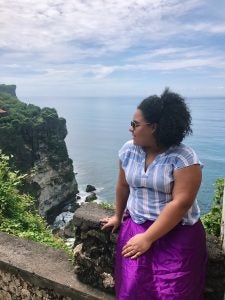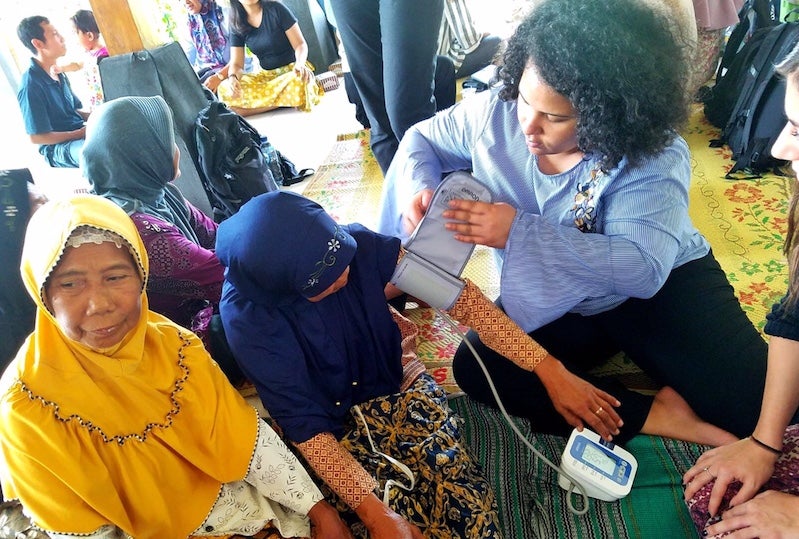Emely Baez aims to battle healthcare disparities around the world
Emely Baez was in high school in Woonsocket, R.I. when she learned about the 1990s Rwandan genocide. A teacher who had traveled to the African nation told of the unimaginable tragedy and introduced Baez and her classmates to a Rwandan woman who had escaped her homeland’s horrors to the U.S., but did not get out unscathed.
“She was injured and had been lying under a pile of bodies in a church for days,” Baez recalled. “The thing is, most of her wounds would have been easily treatable but because of a lack of health care, they became infected and doctors had to amputate. If there were more resources and more people to help, it would have been much better.”
Baez decided then and there she wanted to be one of the people who could help and began pursuing a career in global health, a pursuit that brought the fourth-year senior to the University of Rhode Island College of Nursing. While working toward her bachelor’s degree in nursing, Baez has maintained her focus on a global perspective to healthcare and health disparities, studying abroad in Tanzania, Jamaica, Argentina and Spain.
“You can’t learn everything from a book,” Baez said. “For you to understand the impact of health disparities, you have to see it for yourself. Just because something happens abroad doesn’t mean it doesn’t affect us here. We are a whole global community. I think it’s our responsibility to provide access to health. People shouldn’t be disadvantaged because of where they were born.”
Baez knows something about disadvantages beyond one’s control. After she decided on her life goals, Baez faced the challenge of realizing them. Paying for college would be difficult for her and her family. Then she learned of the Pathways to Nursing program at URI, which supports nursing students from historically underrepresented populations, such as those from economically disadvantaged and minority backgrounds. Aiming to reduce health care inequalities and achieve health equity by increasing diversity in the nursing workforce, the program provides students with resources and support to attain bachelor’s degrees in nursing over five years.
“It was critical for me to get here. Without it, I wouldn’t have been able to come to URI at all,” said Baez, who notes the advisors and the extra support that comes with the program continue to help her meet her goals. “It’s been very instrumental to my success here.”
 In January, Baez joined a group of classmates from the colleges of Nursing, Pharmacy and Health Sciences — which make up the Academic Health Collaborative — on a J-Term trip to Indonesia. The students in Baez’ group worked on prevention of stroke, a leading cause of death in the country. She took residents’ blood pressure and helped educate them on ways to lower the risk of stroke in a society with high-risk factors, including generally salty food and a prevalence of cigarette smoking. One Indonesian woman had particularly high blood pressure, and Baez was able educate her on the importance of taking her medication to lower her risk.
In January, Baez joined a group of classmates from the colleges of Nursing, Pharmacy and Health Sciences — which make up the Academic Health Collaborative — on a J-Term trip to Indonesia. The students in Baez’ group worked on prevention of stroke, a leading cause of death in the country. She took residents’ blood pressure and helped educate them on ways to lower the risk of stroke in a society with high-risk factors, including generally salty food and a prevalence of cigarette smoking. One Indonesian woman had particularly high blood pressure, and Baez was able educate her on the importance of taking her medication to lower her risk.
“As a nursing student, I felt very validated,” Baez said of the trip.
Baez is on track to graduate in May 2019, after which she hopes to continue her journey and join Doctors Without Borders or a similar organization that addresses health disparities around the world.
“What I envision is being part of the taskforce that wherever there’s a disaster, we would be sent in to help,” Baez said, adding that the overseas experiences she has had as a URI student have helped prepare her for what promises to be a challenging career. “Every trip I’ve gone on further fortifies this is what I want to do.”

